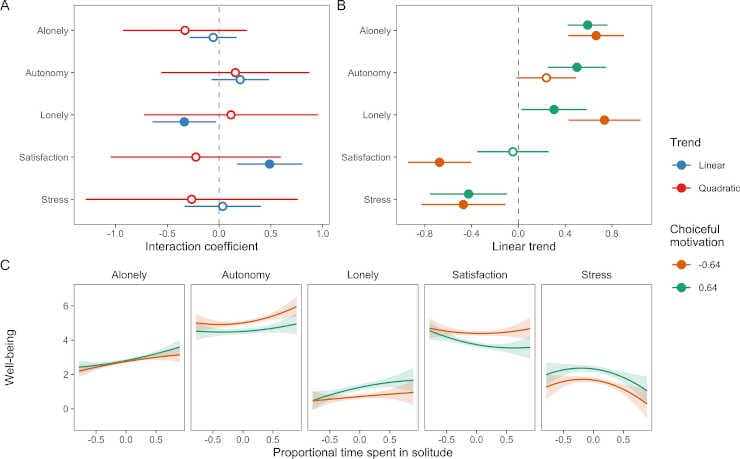The outbreak of COVID-19 made many people wonder about the effects of being alone. How do people react to time spent alone, are there benefits to increasing daily solitude, and is there such a thing as too much solitude?
These inquiries speak to the aim of a growing corpus of research, which is to comprehend the balance between socializing with others and spending time by oneself.
A new study from the University of Reading provides insight into the complicated relationship between alone time and mental health. According to the findings, solitude offers both benefits and drawbacks for one’s well-being.
178 adults aged 35 and older were monitored by researchers in the United Kingdom and the United States for a maximum of 21 days. The group documented intervals of solitude as opposed to social engagement in daily diaries. The participants also reported on daily stress, life satisfaction, autonomy, and loneliness.
The findings revealed that there was no readily apparent optimal balance between solitude and social time; there was no such thing as the ‘correct’ number of hours spent alone. Spending more time alone was associated with improved sensations of stress reduction, implying that solitude had calming effects.
Personal Choice vs. External Factors
A day with more time in solitude is also related to feeling the freedom to choose and be by oneself. However, greater solitude was not all good.
People reported feeling lonely and less happy on days when they spent more time alone, underscoring the potential repercussions of social isolation. Overall, everyday solitude has both favorable and detrimental effects on well-being.
Importantly, the negative impacts were reduced or nullified when solitude was motivated by personal choice rather than enforced by external factors.
Individuals who spent more time alone overall did not report feeling overall lonely or less satisfied, but the benefits remained. People who spent more time alone reported less stress.
The Paradox of Solitude

(A) Estimated interaction coefficients between linear and quadratic solitude time trends and choiceful motivation with 95% CIs. Filled points indicate significant coefficients. (B) Linear associations between solitude time and well-being for different levels of choiceful motivation. (C) Model-estimated associations between time spent in solitude and well-being for − 1SD and + 1SD of choiceful motivation.
Credit: Sci Rep 13, 21160 (2023). Doi: 10.1038/s41598-023-44507-7
What has been called the paradox of solitude — that being alone has seemingly contradictory effects on one’s well-being across studies — is addressed by the balance question, which lies at the core of research on time spent alone.
On the one hand, research studies on positive solitude show that this time has a lot of benefits for well-being. Studies on isolation, on the other hand, find that time spent alone is counter to human nature and damaging to well-being.
“The enforced lockdowns of the pandemic highlighted many of the long-lasting impacts that can occur when we are starved of interaction with other people. Yet this study highlights some of the benefits that solitude can bring. Time alone can leave us feeling less stress and free to be ourselves. This study highlights that spending time alone can be a healthy, positive choice, and that there is no universal level of socialization or solitude to aim for,”
lead author Professor Netta Weinstein, from the University of Reading’s School of Psychology and Clinical Language Sciences, said.
One Day at a Time
According to the authors, while solitude can improve wellness when used thoughtfully, forced isolation can lead to loneliness and discontent. They believe that choosing isolation and using it consciously for its benefits may be the secret to balancing solitary with the demands of modern life.
Individual levels accounted for about 44% of the variance in loneliness and 31% of the variance in aloneness, indicating that most, if not all, of the variations in these experiences varied significantly within people from day to day.
These findings suggest that people’s daily needs for connections with others or for solitude themselves have an impact on their desire for increased connection as well as increased solitude.
Future studies could be quite interesting in determining what those daily causes might be. People may consciously choose to be alone when they are particularly creative or introspective, for instance, the authors say.
Abstract
Two literatures argue that time alone is harmful (i.e., isolation) and valuable (i.e., positive solitude). We explored whether people benefit from a balance between their daily solitude and social time, such that having ‘right’ quantities of both maximizes well-being. Participants (n = 178) completed a 21-day diary study, which quantified solitude time in hours through reconstructing daily events. This procedure minimized retrospective bias and tested natural variations across time. There was no evidence for a one-size-fits-all ‘optimal balance’ between solitude and social time. Linear effects suggested that people were lonelier and less satisfied on days in which they spent more hours in solitude. These detrimental relations were nullified or reduced when daily solitude was autonomous (choiceful) and did not accumulate across days; those who were generally alone more were not, on the whole, lonelier. On days in which people spent more time alone they felt less stress and greater autonomy satisfaction (volitional, authentic, and free from pressure). These benefits were cumulative; those who spent more time alone across the span of the study were less stressed and more autonomy satisfied overall. Solitude time risks lowering well-being on some metrics but may hold key advantages to other aspects of well-being.
Reference:
- Weinstein, N., Vuorre, M., Adams, M. et al. Balance between solitude and socializing: everyday solitude time both benefits and harms well-being. Sci Rep 13, 21160 (2023). Doi: 10.1038/s41598-023-44507-7
